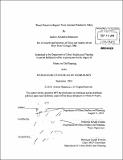| dc.contributor.advisor | JoAnn Carmin. | en_US |
| dc.contributor.author | Betancourt, Andrea Alejandra | en_US |
| dc.contributor.other | Massachusetts Institute of Technology. Dept. of Urban Studies and Planning. | en_US |
| dc.coverage.spatial | s-ck--- | en_US |
| dc.date.accessioned | 2011-04-04T19:34:19Z | |
| dc.date.available | 2011-04-04T19:34:19Z | |
| dc.date.copyright | 2010 | en_US |
| dc.date.issued | 2010 | en_US |
| dc.identifier.uri | http://hdl.handle.net/1721.1/62131 | |
| dc.description | Thesis (M.C.P.)--Massachusetts Institute of Technology, Dept. of Urban Studies and Planning, 2010. | en_US |
| dc.description | Cataloged from PDF version of thesis. | en_US |
| dc.description | Includes bibliographical references (p. 151-156). | en_US |
| dc.description.abstract | Waste pickers constitute the base and most essential work force of the recycling business in Latin American cities. Waste pickers have overtaken this commercial and environmental task as a survival strategy long before the state and private entities became interested in participating in this profitable business. Waste pickers separate, collect and commercialize recyclables informally and under very precarious working conditions. In Bogotá, the waste picking population has been active in defending their rights to continue working in this business and improve their working conditions by gaining the local government's recognition and inclusion in their solid waste management policies. They have faced strong opposition from local and national authorities, who often show little political will to support the social and environmental roles of recycling. In this paper, I explore how waste pickers in Bogotá have approached government authorities in order to acquire their support and build collaborative initiatives. The Association of Recyclers of Bogotá has led a fifteen year-old struggle to petition formal inclusion in local and national policies and to demand dignified working conditions. Waste pickers' persistence, leadership and high organization has guided them through this struggle, leading to the creation of collaborative spaces between waste pickers and the local government. My analysis of this case finds that collaboration, in the highly political topic of recycling, is not straightforward; it is attained through a push and pull dynamic that puts waste pickers and government authorities in constant confrontation, negotiation and conciliation. This long struggle has generated local and national laws, policies and programs that recognize recyclers' work and sets tools to include informal waste pickers in the recycling and waste management processes of Colombian cities. The practice and application of such political tools remains a challenge. However, this long struggle has been effective in making marginal actors - informal waste pickers - more visible in the urban agenda and in building bridges of communication between them, the local government and, to a lesser degree, private cleaning companies. This case shows that long processes of communication, struggle and negotiation are needed to address recycling and waste management through a comprehensive understanding of its social, economic and environmental dimensions. | en_US |
| dc.description.statementofresponsibility | by Andrea Alejandra Betancourt. | en_US |
| dc.format.extent | 151 p. | en_US |
| dc.language.iso | eng | en_US |
| dc.publisher | Massachusetts Institute of Technology | en_US |
| dc.rights | M.I.T. theses are protected by
copyright. They may be viewed from this source for any purpose, but
reproduction or distribution in any format is prohibited without written
permission. See provided URL for inquiries about permission. | en_US |
| dc.rights.uri | http://dspace.mit.edu/handle/1721.1/7582 | en_US |
| dc.subject | Urban Studies and Planning. | en_US |
| dc.title | Waste pickers in Bogotá : from informal practice to policy | en_US |
| dc.type | Thesis | en_US |
| dc.description.degree | M.C.P. | en_US |
| dc.contributor.department | Massachusetts Institute of Technology. Department of Urban Studies and Planning | |
| dc.identifier.oclc | 708399210 | en_US |
